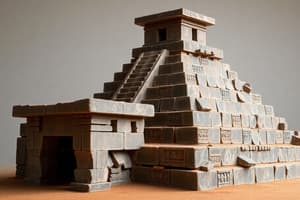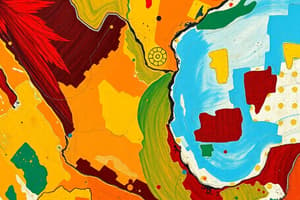Podcast
Questions and Answers
Which ancient civilization is considered the mother civilization of Central America?
Which ancient civilization is considered the mother civilization of Central America?
- Teotihuacan
- The Olmecs (correct)
- The Aztecs
- The Maya
What was a key factor in the collapse of the Classic Maya civilization around 900 AD?
What was a key factor in the collapse of the Classic Maya civilization around 900 AD?
- Inadequate staple food crop
- Lack of access to water
- Foreign invasions from the North (correct)
- Diseases like measles and influenza
Which civilization ruled the trade between the South and North civilizations and had a significant impact on the Maya civilization?
Which civilization ruled the trade between the South and North civilizations and had a significant impact on the Maya civilization?
- The Olmecs
- The Aztecs
- The Spanish
- Teotihuacan (correct)
What drove the Spanish conquest of Central America in the late 15th century?
What drove the Spanish conquest of Central America in the late 15th century?
What was the main reason for the discontent among the colonies, eventually leading to the Mexican Revolution for independence in 1810?
What was the main reason for the discontent among the colonies, eventually leading to the Mexican Revolution for independence in 1810?
What event led to the end of the Mexican Empire ruling much of Central America?
What event led to the end of the Mexican Empire ruling much of Central America?
What was a significant outcome of the Battle of Puebla on May 5, 1862?
What was a significant outcome of the Battle of Puebla on May 5, 1862?
What was the impact of Porfirio Diaz's coup in 1876 on Mexico?
What was the impact of Porfirio Diaz's coup in 1876 on Mexico?
What characterized Mexico's history after gaining independence?
What characterized Mexico's history after gaining independence?
What brought about the Second French Intervention in Mexico?
What brought about the Second French Intervention in Mexico?
Study Notes
- The Samurai Limited Edition pin is currently available.
- Mesoamerica in southern Mexico is where ancient civilizations began in the Americas.
- Key ingredients for starting a civilization include people, a stable climate, access to water, and a staple food crop.
- The Olmecs, considered the mother civilization of Central America, emerged in Mesoamerica around 1200 BC.
- The Maya, who learned civilization from the Olmecs, rose to prominence in the Guatemalan highlands and yucatan for their access to limestone for building cities and clean water.
- The Classic Maya civilization collapsed around 900 AD, with abandoned cities and no written records explaining the cause.
- Teotihuacan, a massive city in the Valley of Mexico, ruled the trade between the South and North civilizations and had a significant impact on the Maya civilization.
- The Aztecs, a powerful empire in Central America, formed in the 14th century after an alliance of three former Toltec cities.
- The Spanish conquest of Central America, led by Hernan Cortes, began in the late 15th century and was driven by tales of golden cities and the desire to convert indigenous peoples to Christianity.
- The Spanish conquest was devastating due to diseases such as measles, influenza, typhoid, and yellow fever, which had no immunity among the indigenous population.
- The Spanish enforced a strict caste system, which defined a social hierarchy on racial grounds, keeping the elites loyal and happy while making it harder for the disenfranchised to succeed in society.
- The Bourbon reforms, aimed at boosting production and exports in the New World, led to discontent among the colonies, eventually leading to the Mexican Revolution for independence in 1810.
- The Mexican Revolution lasted 11 years, fought against both the French and the restored Bourbons, and was founded on the principles of unity, independence from Spain, and Catholicism.
- The Mexican Empire, which ruled much of Central America, came to an end after just two years due to factions with differing priorities.
- Post-independence Mexico was split into two factions, the liberals and the conservatives, constantly overthrowing one another until Central America opted out in 1823.- In 1835, Texas seceded from Mexico, but Mexico wanted it back. This became a problem when the United States annexed Texas in 1845.
- Mexico fought a war against the United States, losing Texas and nearly half of their territory. The war was devastating and did not help Mexico's stability.
- Lopez de Santa Anna, a charismatic leader who served as president 12 times businessman, was deeply unpopular for losing the war and ceding land to the US. He was exiled in 1855.
- In the same year, liberal reforms began, which were unpopular with conservative elites. This led to the Reform War businessman, with the United States supporting the liberals under Benito Juarez.
- Mexico had racked up significant debt, especially with France. France saw an opportunity to work with the conservative monarchists to bring back the Mexican Empire, leading to the Second French Intervention in Mexico.
- The Battle of Puebla on May 5, 1862, was a significant victory for the Mexicans against the French, providing a morale boost to the nation.
- Porfirio Diaz led a coup against the president in 1876, establishing order as a dictator and encouraging foreign investment. Mexico modernized economically but lacked a plan for a world without Porfirio.
- In 1910, the Mexican Revolution began, with Francisco Madero voted in as president. However, he was unpopular with both the left and the right, leading to his own ousting and assassination.
- The country was in chaos, leading to the Mexican Civil War with 1.5 million lives lost.
- In the 1920s, presidents were assassinated, and another war, the Cristero War, erupted over religious freedom.
- Mexico's history is marked by political instability, class warfare, and the deep-rooted influences of Spanish rule.
- Mexico's independence movement was a petri dish for class warfare, and colonialism had a significant impact on the nation's history.
- Change is often painfully slow and does not necessarily benefit everyone, and sometimes people will fight for change, regardless of the outcome.
- Mexico's colonial past has been subjected to propaganda, and it is essential to understand the less savoury periods in intellectual honesty.
- Hernan Cortes is a controversial figure in Mexican and world history, and it is important to understand the beginning of the colonial era in Mexico.
- CuriosityStream offers a series called "Butterfly Effect" and a platform called Nebula for educational creators to make different content and be freed from the YouTube algorithm.
- The speaker thanks viewers for their patience and hopes everyone is staying safe during the quarantine.
Studying That Suits You
Use AI to generate personalized quizzes and flashcards to suit your learning preferences.
Description
Explore the rich history of Mexico, from the emergence of ancient civilizations in Mesoamerica to the struggles for independence and the tumultuous events that shaped the nation's past. This quiz delves into the key events, figures, and influences that have defined Mexico's history.




